Category: News
Call for consultants: Delivering capacity strengthening trainings & other accompaniments to grantee partners
Call for consultants: Delivering capacity strengthening trainings & other accompaniments to grantee partners
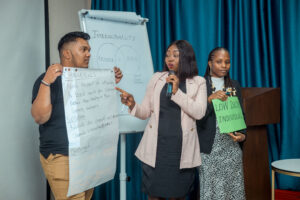
We are hiring a consultant/ team of consultants. to deliver various capacity strengthening trainings and other accompaniments to grantee partners.
As part of our commitment to resourcing, nurturing, and strengthening those best positioned to drive transformative change, African women’s rights and feminist groups, organisations, and movements AWDF seeks to hire a consultant / team of consultants.
This consultancy seeks a skilled facilitator(s) to co-create and deliver one or more of capacity-building training listed below, for AWDF grantee organizations across Africa, taking place between April and June 2025. The facilitator will develop training modules based on the findings of a participatory needs assessment, ensuring relevance and responsiveness. Critically, the facilitator will support grantees in developing tailored, needs-based strategies in:
1. Resource Mobilisation Fellowship
2. Communication, Advocacy & Digital security
3. Research & Advocacy skills building teach-in session
Application Process
Please submit a concise technical and financial proposal, along with your CV or a profile highlighting relevant experience, to wame@awdf.org , copying chipo@awdf.org by close of business on April 7th, 2025.
For more details on this consultancy, please click HERE
We’re Hiring! Programme Assistant – CBO / NGO Entities Cluster
We’re Hiring! Programme Assistant – CBO / NGO Entities Cluster
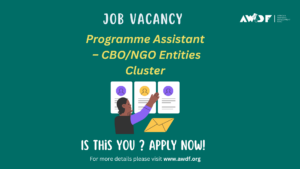
Are you a highly motivated individual passionate about women’s rights in Africa, excited about African feminisms, and committed to gender justice? Do you have experience in programme administration, planning, and coordination? Are you eager to support feminist movements and strengthen CBO/NGO entities across Africa? We would love to have you on our team!
The Programme Assistant – CBO/NGO Entities Cluster will work closely with the Senior Programme Officer to support the implementation of AWDF’s CBO/NGO strategy, contributing to movement-building, feminist resourcing, and gender justice advocacy. This role requires a proactive and organised individual who can support programme implementation, budget monitoring, relationship management, and organisational learning.
Find more details here: https://bit.ly/43NYfNU
Apply by Thursday, 27th March 2025. .
Consultancy Opportunity: Programme Evaluation of the KASA! Initiative
Consultancy Opportunity: Programme Evaluation of the KASA! Initiative
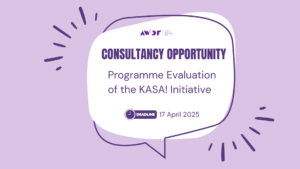
The African Women’s Development Fund (AWDF) and its project partners seek independent evaluation consultants to evaluate the implementation of the KASA! Initiative which supports sexual violence prevention and advocacy interventions in Ghana, Nigeria and Senegal and at regional levels. The evaluation will be used to inform the necessary adjustments or changes for the remainder of the initiative as well as to inform and improve the development of future programming, including grant-making support to our partners, advocacy strategy and stakeholder engagement. The evaluation is expected to be carried out in 3 months, from June to August 2025.
Scope of Work
In line with AWDF’s strategic priorities, AWDF is commissioning a mid-term review of the KASA! Initiative, which is just past halfway through the initial five-year contract. The programme evaluation will cover the implementation period from June 2021 to December 2024. KASA! The initiative has supported 45 women’s rights and feminist organisations (24 in Nigeria, 12 in Ghana and 9 in Senegal) since June 2021. The duration of the evaluation is 3 months. The deliverables include an inception report, data collection, analysis and reporting, two validation workshops and final delivery of the evaluation report including a slide set and infographic.
Qualifications and Experience Required
The call is open to individuals or teams of consultants led by women or gender-diverse persons in Africa, preferably Ghana, Nigeria and/or Senegal, with the following required skills and experience:
- Hold a graduate degree in Social Sciences or related studies
- Have at least 8 to 10 years of work in the Global South towards promoting and protecting human rights and gender/social justice
- Demonstrated experience working in the area of sexual violence in Senegal, Ghana and Nigeria and/or across Africa
- Demonstrated experience in designing and carrying out evaluations for large multi-actor programmes, using Feminist MEL and related evaluation approaches
- Experience in evaluating similar programmes in the three focus countries and/or regions in the Global South
- Proficiency in written and spoken English and French
- English and French writing skills and report-writing experience.
- Commitment to AWDF’s values of feminist leadership, accountability, diversity, respect and solidarity
- Demonstrate excellent interpersonal skills and a flexible attitude
- We will prioritise applicants based in Ghana, Nigeria or Senegal.
How to Apply
Please submit the following as part of your application:
- Profile, capability statement and CVs of the consultant(s) presented to carry out the MTR
- Proposed evaluation plan, including a work plan and budget. This budget should include the estimated consultancy fee for the entire assignment in United States Dollars, supported by an appropriate breakdown analysis of fees plus a detailed estimated travel budget.
- Overview of similar work and assignments undertaken
- 3 references
to consultants@awdf.org by 17 April 2025. Email subject header: Consultancy, MTR Kasa! Initiative
Download the terms of reference for more information.
IWD 2025 : Stories of Resistance & Resilience
IWD 2025 : Stories of Resistance & Resilience
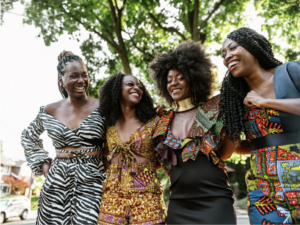
As we commemorate International Women’s Day 2025, African Women’s Development Fund (AWDF) reflects on the remarkable victories, challenges, and unwavering resilience of feminist movements across the African continent. Through in-depth conversations with our partners, we have gathered powerful stories of perseverance, advocacy, and transformative impact.
This year’s theme, “Accelerate Action for Gender Justice” – #AccelerateAction, underscores the urgency of sustaining feminist movements and ensuring that gender justice remains a priority in the face of growing resistance. This article amplifies the voices of AWDF’s KASA, Leading From South, and KOMBOA partners in the Democratic Republic of Congo, Niger, Mozambique, Angola, Zimbabwe, and Nigeria—feminist organizations that continue to break barriers and champion the rights of women and marginalized communities.
REFED-NK, Democratic Republic of Congo: Defending Women’s Rights Amidst Conflict
Operating in North Kivu, Democratic Republic of Congo, Réseau Femmes et Développement Nord-Kivu has been advocating for women’s rights since 2004. The organization tirelessly works to protect and empower women, girls, children, and marginalized groups, despite persistent instability and human rights violations in the region.
“The current state of our city is deeply alarming, characterized by severe human rights violations, including sexual violence against women and young girls. Since January 23, our activities have been suspended due to escalating insecurity. We have been unable to access our office, as ensuring the safety of our staff is paramount. However, we remain hopeful that peace will soon be restored, and we will once again raise our voices for justice and equality.”
— Deborah Mupita, Executive Secretary, REFED-NK
The call for transitional justice for Congolese women victims of war remains central to REFED’s mission. In times of crisis, their advocacy is more crucial than ever.
CNJFL, Niger: Empowering Young Women Amidst Growing Opposition(LFS Partner)
The Cellule Nigérienne des Jeunes Filles Leaders is committed to strengthening girls’ and women’s leadership, fighting gender-based violence, and promoting education and healthcare access in Niger. However, their mission is increasingly challenged by conservative forces that seek to suppress progress.
“Conservative sociocultural norms and opposition from religious and political groups obstruct the implementation of our initiatives. Despite these barriers, we have adopted transformative approaches that allow us to continue our work effectively. This year, we successfully organized mentorship and leadership camps, equipping over 60 young urban and rural girls with the skills to become changemakers.”
— Halimatou Zika, President, CNJFL
CNJFL’s achievements are made possible through the unwavering solidarity of feminist allies, including AWDF.
AMPDC, Mozambique: Strengthening the Fight Against Gender-Based Violence (KOMBOA Partner)
In Mozambique, the Associação das Mulheres para Promoção de Desenvolvimento Comunitário plays a pivotal role in advocating for gender justice. Their work focuses on influencing societal attitudes, combating gender-based violence (GBV), and empowering women economically.
“One of our greatest achievements has been the establishment of the Femicide Watch and the Unified System for the Prevention and Response to Gender-Based Violence (GBV). The support from public institutions and feminist movements in Sofala Province has been instrumental in driving institutional change. “
— Angela Jorge, Executive Director, AMPDC
Mwana Pwo, Angola: A Lifelong Commitment to Sexual and Reproductive Health Rights (LFS Partner )
Despite systemic obstacles, Mwana Pwo in Angola continues to provide critical information on sexual and reproductive health. Their work is fueled by an unwavering sense of duty and passion.
“What keeps me going is my deep commitment, passion, and love for this work. Supporting young women who have survived violence and oppression has been the most powerful and transformative aspect of my journey. Even in our lowest moments, we must lift our heads high and keep moving forward.“
— Aida Gilberto João, Gender Assistant, Mwana Pwo
Tag a Life International, Zimbabwe: Pushing for Legal Reforms and Leadership
Nyaradzo Mashayamombe , Founder and Executive Director of Tag a Life International, remains steadfast in her fight for women’s rights in Zimbabwe and across Africa.
“Despite rising anti-women movements, I draw strength from the women before me. They fought for our rights, and now it is our duty to carry the baton forward. Each time a girl graduates through our Leadership Economic Mentorship (LEMS) program and steps into public life—whether in politics or business—it is a triumph. One of our young women even became a mayor, proving that feminist activism leads to real change.“
A landmark victory for her organization was leading the advocacy for the Education Amendment Act, signed into law by the President of Zimbabwe. This legislation ensures that girls from rural and low-income communities have access to state-funded basic education.
Girl Child Art Foundation, Nigeria: Art as a Tool for Healing and Resistance (KASA Partner)
In Nigeria, Girl Child Art Foundation harnesses the power of art, storytelling, and advocacy to combat gender-based violence.
“We refuse to be silenced. Through murals, community workshops, and creative expression, we create safe spaces where girls reclaim their voices. For us, this was proof that art is not just about painting and drawing—it is a powerful medium for expression, healing, and change. ”
— Blessing Onyejike-Ananaba, Executive Director, GCAF
The Power of Feminist Funding and Solidarity
The testimonies from AWDF partners reinforce the vital role of feminist funding in ensuring the resilience, growth, and sustainability of grassroots feminist movements. In regions where civic space is shrinking and opposition is intensifying, organizations like AWDF provide crucial support that enables activists to continue their work despite mounting challenges.
As we mark #IWD2025, we reaffirm our commitment to #AccelerateAction—ensuring that feminist movements across Africa remain strong, impactful, and enduring. The fight for justice and gender equality continues, propelled by the steadfast solidarity of women dedicated to creating lasting change.
Bintou Mariam Traoré, communications Officer
The Cost of Inaction: Fund African Feminists and Women Rights Organisations to End FGM
The Cost of Inaction: Fund African Feminists and Women Rights Organisations to End FGM

In October 2024, the death of 18 year old Napala Nangiro in Uganda, was reported by UNFPA. She tragically lost her life during childbirth due to complications related of Female Genital Mutilation (FGM). Not long before then, in August 2024, the death of another teenage girl following a circumcision operation in a private hospital in Egypt had also been reported in the news. Again, earlier in the year a DW report had revealed the death of three young girls in Sierra Leone – aged 12, 13, and 17, allegedly due to FGM complications. These are more than just isolated news reports and occurrences, these deaths are not just a tragedy; they are a stark reminder of what happens when we fail to adequately support and resource the fight against this harmful practice. Through our work and research, we know these documented cases represent only a fraction of the true toll, which is countless other deaths and complications that go undocumented.
Today, as we mark the International day of Zero Tolerance against FGM, the stakes could not be higher. According to the UNICEF 2024 data, over 230 million girls and women have undergone FGM, with Africa accounting for 144 million – almost half of the total number. Without accelerated action, 68 million more girls worldwide face this risk of FGM by 2030 making this more African girls at risk. Behind these statistics are daughters, sisters and humans whose bodies, futures and lives hang in the balance.

Across Africa, the legal landscape for protecting girls from FGM reveals a troubling pattern of gaps between legislation and implementation. Guided by the Maputo Protoccol on the rights of women in Africa, majority of African countries have passed legislations to criminalise FGM, however, implementation and progress remain slow. The landscape is increasingly complex, especially with the emergence and rise of anti-rights movements in Africa. The Gambia, for example witnessed a troubling development in 2024 when members of parliament proposed legislation to reverse the country’s 2015 ban on FGM. This attempt, though ultimately unsuccessful, revealed the fragility of progress and the persistent influence of those who seek to maintain this harmful practice under the guise of cultural and religious preservation.
In Mali, despite a prevalence rate of approximately 89% among women aged 15 to 49, efforts to enact anti-FGM laws have stalled due to resistance from religious and traditional leaders. While Chad has incorporated FGM prohibition into its Penal Code, the law’s effectiveness is undermined by vague definitions and unclear enforcement mechanisms. This pattern repeats across the continent: some countries have strong laws that go unenforced, others have ambiguous legislation that proves difficult to implement, and still others have no legal protections at all. The result is devastating, leaving millions of girls vulnerable to FGM despite decades of advocacy for their protection. When anti-FGM laws exist merely on paper, or are non existent, perpetrators act with impunity while girls pay the price with their bodies and lives.
Despite severe constraints, African feminist and women led organisations are spearheading a revolutionary approach to ending FGM, achieving remarkable success despite severe resource constraints. The evidence is compelling, when African women lead anti-FGM initiatives, they consistently deliver transformative results. In The Gambia, feminists and women’s rights organisations demonstrated their power when they successfully countered attempts to repeal anti-FGM legislation through strategic community mobilisation and effective engagement with lawmakers, protecting countless girls from harm. Kenya’s journey showcases the impact of persistent advocacy, culminating in the landmark 2011 Prohibition of Female Genital Mutilation Act. This achievement was further strengthened by the pioneering 2016 East African Community Prohibition of Female Genital Mutilation Bill, marking the first regional approach to addressing cross-border FGM.
Across countries and communities, AWDF grantee partners exemplify these results through their informed interventions. The Kitabu Integrated Development Association in Uganda is breaking new ground by empowering young girls to resist labia minora elongation practices while promoting positive body image and self-esteem, ensuring a future where girls are free from harmful traditional practices. In Benin, the Réseau des Femmes Leaders pour le Développement (RFLD) implements comprehensive anti-FGM programs that combine survivor support, legal advocacy, healthcare worker training, and community education, with a current focus on incorporating FGM awareness into school curricula. Similarly, REPSFECO’s innovative “Touche pas mon sexe” project addresses vaginal lip stretching through community dialogues and leadership training for girls across six districts.
In Nigeria, the advocacy efforts of Centre for Women Studies and Interventions in Ebonyi and Cross River States led to positive behavioural change and the establishment of a customary law against FGM in Ekajuk Kingdom of the Ogoja Local Government Area. In Sierra Leone, despite the lack of specific law criminising FGM, Women Action for Gender Equality and Women’s Action for Human Diginity continue intervention in rural communities through advocacy, trainings and community initiatives to inspire positive change. African feminists and women-led organisations across the continent are employing a multi-faceted approach encompassing grassroots organizing, educational workshops, legislative advocacy, and strategic funding initiatives.
These successes, among the many wins and progresses led by African feminists and women are even more remarkable given a devastating reality. According to the 2023 Where is the Money for Black Feminist Movements report by the Black feminist Fund 5% of human rights funding and about 0.1% – 0.35% of global foundation giving went to Black women, girls and trans people.
Over the past 25 years, AWDF has witnessed the transformative impact of supporting feminist and women led organisations and movements fighting FGM across the continent. We stand in solidarity with them and the women and girls who have survived FGM in Africa and across the world. The value and power of feminist and women led funding and interventions cannot be overemphasised. So we reaffirm our commitment to resourcing and supporting movements, women’s rights organisations,, feminist organisations, collectives and activists to accelerate progress in ending FGM. The price of inaction is heavy, the time to fully resource African feminists and women to eliminate FGM and all other forms of violence is now.
The solution is clear. We must:
- Scale up flexible, multi-year funding for African women and feminist led anti-FGM initiatives.
- Fund comprehensive approaches that address FGM within broader gender justice work.
- Support African research and knowledge creation on prevention and social change strategies.
- Resource survivor and community led advocacy practices.

As we move forward, we must understand and accept that stopping FGM requires more than a commemoration day. This year’s theme Stepping up the Pace: Strengthening Alliances and Building Movements to End FGM emphasises the need to double efforts and push for more long term strategic funding of feminist movements and women’s rights organisations. The way to zero tolerance for FGM is through the heart of African communities led by African women, girls and feminists.
To our donors and funding partners, the time for token support must end with all of us. African feminists and women’s organisations have proven their effectiveness with minimal resources. Just imagine what they could do with adequate and sustained funding.
To African governments, match strong legislation with robust implementation and community engagement. The success stories in your own countries show what is possible when political will meets grassroots action. Your support for feminists and women’s organisations must go beyond policy to include substantial and sustained action and resourcing.
Girls do not have to die from the persistence of this harmful practice. Their futures should not be stolen by FGM and our collective failure to adequately resource those fighting to end this practice. Let this International Day of Zero Tolerance and days to follow mark the moment when rhetoric finally matches resourcing, commitment and action.
Holistic approaches in ending FGM in The Gambia: GAMCOTRAP’s Resilience
Holistic approaches in ending FGM in The Gambia: GAMCOTRAP’s Resilience

In 2025, FGM remains a persistent practice in The Gambia, despite being banned since 2015. The parliamentary debate over the anti-FGM law in 2024 highlighted the ongoing challenges. When a private member’s bill sought to repeal the existing law, 30 out of 65 members of parliament voted to maintain the anti-FGM law in the country.
The Gambia Committee on Traditional Practices Affecting the Health of Women and Children has been at the forefront of combating FGM through a multifaceted approach. Their three-decade-long efforts focus on culturally sensitive strategies that challenge harmful practices while respecting community dynamics. Key initiatives include community-based surveillance, where regional coordinators monitor and prevent FGM cases. In a recent success, five out of eight girls were saved from undergoing FGM in the Central River Region.
Dr. Isatou Touray, Executive Director of GAMCOTRAP powerfully states, “The fight against FGM is not just the responsibility of women, it requires the collective effort of all stakeholders, including men, policymakers, traditional leaders, and the global community.” The organisation employs comprehensive strategies such as engaging traditional and religious leaders, empowering youth and men as allies, and providing alternative employment for ex-circumcisers. Their work extends beyond immediate intervention to systemic change through policy advocacy and rights education
Key Learnings and Insights
A key lesson for GAMCOTRAP in their efforts to end the persistence of FGM in Gambia is that sustainable change requires holistic community involvement. When women and girls understand their rights and the risks associated with FGM, they become powerful agents of change. The approach combines legal frameworks, social mobilization, and economic empowerment to create lasting impact.
Notably, the fight against FGM is no longer seen as solely a women’s issue. Men, youth, and community leaders are increasingly recognised as crucial allies in challenging harmful traditions while respecting cultural values.
Support Needed to Accelerate Change
To accelerate FGM elimination, a coordinated approach is essential. This includes:
- Systematic engagement of community structures
- Survivor-led programs challenging gender norms
- Increased funding for grassroots organizations
- Sustainable financial support for prevention programs
***
The contents of this article are from GAMCOTRAP, an AWDF grantee partner in The Gambia, supported under the Komboa Initiative
Join us and make an impact. We are hiring – Programme Assistant (Shared) Impact and Learning and Funded Initiatives
Join us and make an impact. We are hiring – Programme Assistant (Shared) Impact and Learning and Funded Initiatives

Our team is growing at AWDF, We are hiring a Programme Assistant (shared) for Impact and Learning and Funded initiatives.
Are you a dynamic individual with experience in providing monitoring, evaluation, and learning, as well as administrative and programmatic support, contributing to the efficient operation of AWDF’s Impact and Learning I&L, Resourcing and Funded Initiatives (FI) Project Teams?
Are you excited to contribute and work collaboratively across teams to assist the I&L and Resourcing functions? These teams are responsible for leading the re-imagining, implementation and learning in support of AWDF’s new strategy work with African women’s rights and feminist organisations, gender-diverse communities, collectives and movements working for gender justice in Africa.
Are you comfortable with supporting the piloting of responsive, feminist accompaniment, resourcing and MEL approaches based on movement priorities? If you responded yes to our questions, then we would like you to join our team!
How to Apply:
To apply check out more information and apply HERE
Applications for the vacancy should reach AWDF no later than Wednesday 19 February 2025. Due to our limited capacity, only short-listed candidates will be contacted for additional information and interviews.
AWDF Leaders Recognized Among Avance Media’s 100 Most Influential African Women 2024
AWDF Leaders Recognized Among Avance Media’s 100 Most Influential African Women 2024
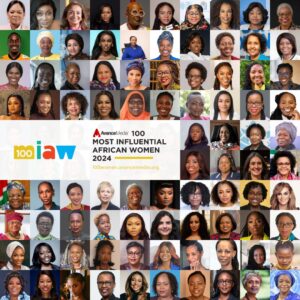
Two AWDF trailblazing leaders, Francoise Moudouthe, our CEO, and Taaka Awori, our Board Chair and CEO of Busara Africa, have been named among Avance Media’s 100 most influential African women 2024, marking a significant milestone in the recognition of female leadership on the continent. Their inclusion highlights a broader shift in Africa’s development landscape, where women are taking center stage in driving sustainable change. Both leaders have demonstrated exceptional vision in advancing gender justice and social transformation across the continent, implementing innovative solutions to long-standing challenges.
You can find more information on the incredible nominees 
This recognition not only celebrates individual achievement but also underscores the growing impact of female leadership in shaping Africa’s future. We join in celebrating all remarkable individuals who made this year’s list, each contributing to the continent’s progressive transformation.
AWDF welcomes new Director of Partnerships and Philanthropy
AWDF welcomes new Director of Partnerships and Philanthropy

We are starting this new year with an incredible addition to our team
Our team is excited to welcome Moreen Majiwa, our new Director of Partnerships and Philanthropy. Moreen is a pan-African feminist from Kenya with over a decade of experience working on critical issues such as sexual and gender-based violence, women’s Participation and Leadership, and managing multi-country and multi-partner programmes.
As the new Director of Partnerships and Philanthropy, Moreen joins the team with a bold vision for transformative change across Africa. Her approach centres on amplifying marginalised voices, reimagining philanthropic models, and building movements that breathe with resilience and hope.
Guided by the philosophy of Ubuntu “I am because we are” she sees connection as the heartbeat of liberation. Her dream dinner companion? Funmilayo Ransome-Kuti, a pioneering spirit whose life embodied resistance through art, culture, and unwavering commitment to justice.
Join us and welcome Moreen to the AWDF team and community. We look forward to a fruitful journey with her.
Send her your well wishes HERE
AWDF is thrilled to announce the Partnerships and Philanthropy Officer and Finance Intern opportunities!
AWDF is thrilled to announce the Partnerships and Philanthropy Officer and Finance Intern opportunities!
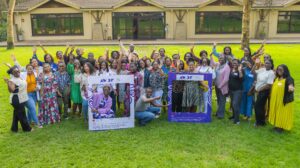
The African Women’s Development Fund is thrilled to announce two new exciting opportunities. Come and join our team, Apply today.
Partnerships and Philanthropy Officer
We are hiring to fill a vacancy for the position of Partnerships and Philanthropy Officer. To fill this position, we are looking for a highly motivated person who is innovative, passionate about women’s rights in Africa, excited about African feminisms and embraces African women’s rich diversity to join our team.
Building on its strong track record, in 2023 AWDF launched Lemlem, a ten-year strategic framework (2023-2033), which guides its efforts to advance gender equality and gender justice for girls, women and gender-diverse people across Africa. At its core, the strategy’s focus is on resourcing, nurturing and strengthening those who are best placed to achieve transformative change: African women’s and feminist groups, organisations and movements.
The Partnerships and Philantropy Officer will be central to AWDF’s effort to cultivate, maintain and strengthen AWDF’s relationships with existing and new partners in feminist and social justice movements, the philanthropic sector and international development. She/They will also be key to the execution of initiatives and activities to advance AWDF’s philanthropic advocacy and influencing agenda – working closely with the Director for Partnerships and Philanthropy (who manages the role), the CEO and the Director of Programmes.
How to Apply:
For more information on the role, and also on the application process, please visit the Application Portal HERE
Applications for the vacancy should reach AWDF no later than Friday 10th January 2025. Due to our limited capacity, only short-listed candidates will be contacted for additional information and interviews.
Finance Intern (Due Diligence desk )
Another exciting opportunity we have is the Finance Intern position (Due diligence desk)
AWDF requires the services of a Finance Intern to support the work of the Finance Department. The intern will have the opportunity to learn as well as support the finance team to achieve its set objectives. We are looking for an intern who is dynamic, curious, innovative, conscientious, and believes in the true value of effective and efficient financial management. The Finance intern will report to the Finance Manager and will have responsibilities of supporting key financial management processes including planning, transaction processing and reporting and risk management. The Intern will be responsible for receiving, reviewing, recording, uploading, filing documents for processing documentation and any other duties assigned.
How to Apply:
For more information on the role, and also on the application process, please visit the Application Portal HERE
Applications for the vacancy should reach AWDF no later than Friday 10th January 2025.
In line with AWDF’s Mission, qualified African women are encouraged to apply.

